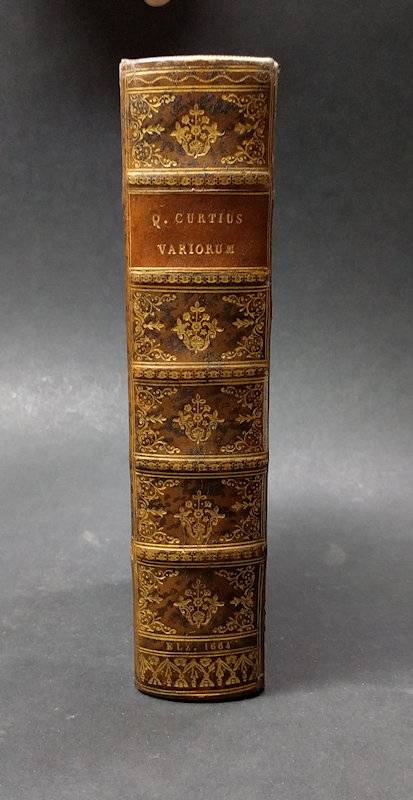CURTIUS RUFUS. Q. Curtii Rufi Historia Alexandri Magni. Cum notis selectiss. Variorum, Raderi, Freinshemii, Loccenii, Blancardi, &c. Editio accuratissima. Accurante C.S.M.D.
Amsterdam (Amstelodami), Ex officina Elzeviriana, 1664.
8vo. (IV),93,46,(1 blank);751,(1) p. folding map, and folding plate. Mottled 18th century calf 19.5 cm (
Ref: STCN ppn 094956561; Schweiger 2,320; Willems 1325; Berghman 2054; Rahir 1369; Moss 548; Dibdin 375; Graesse 2,311; Ebert 5549) (
Details: Beautiful binding. Back with 5 raised bands and panelled gilt with repeating floral motifs; in the center of the compartments gilt birds visit a bunch of flowers. Brown morocco letterpiece in the second compartment. All 3 edges of both boards gilt. Edges of the bookblock dyed red. Endpapers marbled. Engraved title, which depicts a world conquering Alexander on horseback, trampling his enemy Darius. He is accompanied by a flying Fama, who blows her horn. The plate depicts the 'fons solis', a fountain in the Egyptian oasis of the temple of Ammon, cool at midday and warm at the rising and setting of the sun. Alexander visited this famous oracle in order to obtain an answer concerning the divinity of his origin; the map shows the triumphal march of Alexander through Egypt and Asia) (
Condition: Fine. Some rubbing on the upper board. Some light foxing) (
Note: This is a typical Variorum edition. It offers a 'textus receptus' which is widely accepted, accompanied with the commentary and the annotations of various specialists, taken, or excerpted from earlier useful, normative or renewing editions. Editions like these, 'cum notis Variorum', were useful, but never broke new ground. The production of these sometimes overloaded 'dustbins' of knowledge was the specialty of Dutch scholars of the 17th and 18th century. The compilers seldom were great scholars, but often hard working schoolmasters. Their involvement in publishing a new edition was limited to the necessary, but ungrateful task of the beast of burden. In a 'Variorum' edition of Claudianus published by the same Elzevier a year later, we get a glimpse of such a division of labour. There the 'typographus', i.e. Louis and/or Daniel Elzevier, tells the reader that a 'vir diligentissimus' the schoolmaster Cornelius Schrevelius, excerpted from the best sources all that was necessary for a good understanding of the text. 'Quod ad praestantissimi poetae intellectum pertineret, ex optimis Doctissimorum Virorum', follows a number of names of Claudianus editors and commentators, 'aliorumque, qui antea in eo illustrando elaborarunt, notis & commentariis selectissima quaeque excerpsit'.
§ Quintus Curtius Rufus, probably first cent. A.D., is the author of the only surviving monography on Alexander the Great in Latin. He was historian enough to use sources, which drew from different traditions, conscientiously. His aim was not to write great literature, but his 'Historia' certainly possesses great narrative qualities, acquired by a thorough knowledge of the epic and historiographic tradition, and a training in Roman rhetoric. (NP, s.v. Curtius) This work, consisting of 10 books, did not survive in its entirety, the first 2 books are lost. Now, the text of Curtius Rufus is preceded here by a rather strange philological accomplishment by the German scholar Johannes Casper Freinsheim, 1608-1660. He endeavoured to repair the loss of the 2 lost books by a composition of his own, a feat which was much admired by his contemporaries. He published this new text earlier in his edition of 1640. Moss declares that this supplemented text is 'scarcely descernible from that of Q. Curtius'. This 'Variorum' edition of Curtius Rufus was produced by the above mentioned Cornelis Schrevelius, 1608 - 1664, who took his doctoral degree in Paris as a Doctor of Medicine in 1627. Hence C.S.M.D. on the title, that is 'Cornelis Schrevelius Medicus Doctor'. He was Rector of the Schola Latina at Leiden) (
Provenance: name in ballpoint on the front flyleaf of Lennart Håkanson, professor of Latin Literature at the Univ. of Uppsala, 1980-1987) (
Collation: pi2, a-h8, i4, k2; A-3A8) (Photographs on request)
Book number: 130180 Euro 340.00
Keywords: (Oude Druk), (Rare Books), Altertum, Altertumswissenschaft, Antike, Antiquity, Elzevier, Latin literature, Quintus Curtius Rufus, Roman history, Schrevelius, classical philology, römische Geschichte, römische Literatur
 CURTIUS RUFUS.
CURTIUS RUFUS.